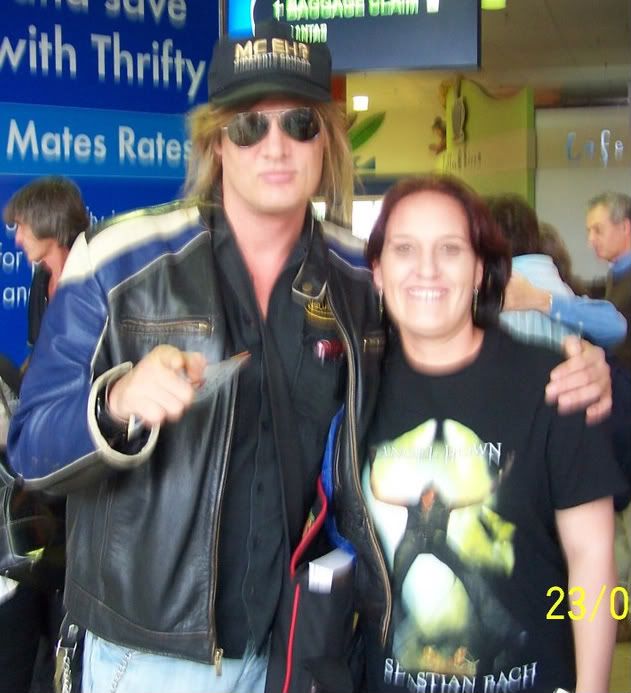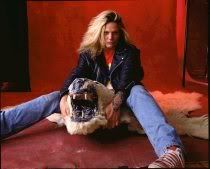Post by butts on Jul 31, 2009 7:13:16 GMT -5
Great positive article from Grammy.com
Blurring The Lines
July 30, 2009
Rock and pop artists going country, and vice versa
GRAMMY.com
Bryan Reesman
Over the course of the last two years numerous pop/rock artists have donned their Stetson hats and cowboy boots and taken forays into the country world. From Avenged Sevenfold to Bon Jovi to Jessica Simpson, some efforts have been mere dalliances while others more concerted efforts, but they all have arrived at a time when the different genres have found more common ground to cross-pollinate fruitfully. In recent years artists such as Daughtry, Rascal Flatts, Shania Twain, and Keith Urban have been blurring the lines between country and rock and pop.
"It got to where people like Darius Rucker could imagine themselves in that context a little easier than they could have 10 or 20 years ago," observes Chris Neal, music editor at Country Weekly. "It's just at heart a welcoming community. There's a tradition of Southern hospitality and giving people a chance to see if they can do it."
"I think rock, pop and urban artists are starting to understand that country music is not all about yee-haws and hay bails anymore," believes John Rich, country musician/producer and host of "Gone Country," a reality show competition that has tested the potential of non-genre artists such as Sebastian Bach, Bobby Brown and Twisted Sister frontman Dee Snider. "Our fans are true American music fans, and as long as you approach them with respect and integrity in your music, as an artist from another genre you have a shot at winning them over and having success in country music."
Jessica Simpson had a short-lived attempt with "Come On Over" from her country album Do You Know, which immediately hit No. 1 on the country albums chart, but faltered soon after. Def Leppard recorded a duet last year with Tim McGraw titled "Nine Lives" that they performed on this year's CMT Awards. Bon Jovi's 2007 country-influenced album Lost Highway hit No. 1 on the Billboard 200 and had one crossover hit in "(You Want To) Make A Memory."
On the flip side, Kid Rock (who once called his music "hick-hop") increased his sales and audience with last year's Southern rock-influenced single "All Summer Long" from the album Rock 'N' Roll Jesus. Rock and Sheryl Crow collaborated on the country song "Picture" in 2001 that became a radio hit and placed them ahead of the curve, but their respective labels reportedly showed little interest in promoting the song, which was later recorded by Allison Moorer for a successful single release.
On the more traditional side of things, Robert Plant and Alison Krauss' bluegrass collaboration Raising Sand has sold well and won multiple GRAMMYs. Crossover folk artist Jewel released her country album Perfectly Clear last year. Produced by Rich, it sold a modest amount but was praised by many as being very genuine.
"Personally, I like the Jewel record a lot," says Neal. "I think she really approached country music with a lot of care, and she spent several years getting acquainted with this community and writing and collaborating with people before she really took the plunge. So when she did it, it sounded really organic and very natural for what she does."
Neal also praises Hootie & The Blowfish frontman Darius Rucker, whose 2008 gold-certified solo album Learn To Live hit the right notes with country radio and fans by snagging two No. 1 country hits. The frontman had contemplated a country album for a long time, and the timing and circumstances turned to be right when he made the transition.
"Hootie & The Blowfish had been on the road for a long time, and I wanted to take a break," Rucker recalls. "The thing that was organic and wild for me was that I was going to do it on my own. The reason I made [the album] was guys like Randy Foster, Lyle Lovett, New Grass Revival, Nanci Griffith, and Dwight Yoakam were just blaring through our band for years, and I wanted to sound like them."
Other crossover artists initially dared not dream of crossing over to country. When he first appeared on "Gone Country," Dee Snider recalls, "I started by saying I don't like country music, and I ended by realizing that saying I don't like country is as dumb as saying I like all rock and roll. I learned that there are so many different kinds of country. I embraced and fell in love with the hell-raising country [of] Hank Williams Jr. and Gretchen Wilson. And the community itself was so welcoming to me."
The song "30" that Snider wrote for "Gone Country" appears in a hard rock version on the 25th anniversary reissue of Twisted Sister's Stay Hungry, while a countrified version will be released as a single.
There is a definite correlation in the loyal, hell-raising, blue-collar audiences drawn to metal, hard rock and country, and those genres extend out to a wider range of listeners. The country crossover that rock/pop artists are stretching towards has also appeared influential to country artists, as they incorporate sounds from outside genres.
"In the last few years I have seen, just from interviewing a lot of artists, that the big country influences are Garth Brooks, Merle Haggard and George Strait, but I hear a lot of that and '80s metal or Southern rock," notes Neal. "Carrie Underwood is a huge fan of '80s hair bands. Go to one of her shows and she'll cover a Skid Row song or a Mötley Crüe song or a couple of Guns N' Roses songs. A lot of people are influenced by that stuff right now, so that makes it more hospitable for artists such as Sebastian Bach to come here and do a country record."
Avenged Sevenfold's recent ballad "Dear God" spotlights a country twang. "I know the guys from Avenged [Sevenfold], and they have a major respect for the lyrics of country music and the way real country artists truly live the words to their songs," remarks Rich. "It doesn't matter what neighborhood you grew up in, being real is being real and it garners major respect in the world of music."
For many artists crossing over, country has been a flirtation. For others, it is a career trajectory that will continue beyond the passing of the fad. "I'm already writing the next record, and Brad Paisley and I are going to try to write a duet together," reports Rucker. "As I told Capitol when I made the deal, this is a career move."
While some might think that mainstream artists going country might irk purists or devoted genre fans, it has been welcomed when executed well. "From a pop cultural point of view, country music has always had a bit of an inferiority complex," reveals Neal. "I think country music and Nashville in particular feels like the country thinks they're all hillbillies and behind the times. Whenever we get a touch of that rock and roll cool, it's good for the image of country music, and we appreciate that."
(Bryan Reesman is a New York-based freelance writer.)
www.grammy.com/Recording_Academy/News/Default.aspx?newsID=3457
Blurring The Lines
July 30, 2009
Rock and pop artists going country, and vice versa
GRAMMY.com
Bryan Reesman
Over the course of the last two years numerous pop/rock artists have donned their Stetson hats and cowboy boots and taken forays into the country world. From Avenged Sevenfold to Bon Jovi to Jessica Simpson, some efforts have been mere dalliances while others more concerted efforts, but they all have arrived at a time when the different genres have found more common ground to cross-pollinate fruitfully. In recent years artists such as Daughtry, Rascal Flatts, Shania Twain, and Keith Urban have been blurring the lines between country and rock and pop.
"It got to where people like Darius Rucker could imagine themselves in that context a little easier than they could have 10 or 20 years ago," observes Chris Neal, music editor at Country Weekly. "It's just at heart a welcoming community. There's a tradition of Southern hospitality and giving people a chance to see if they can do it."
"I think rock, pop and urban artists are starting to understand that country music is not all about yee-haws and hay bails anymore," believes John Rich, country musician/producer and host of "Gone Country," a reality show competition that has tested the potential of non-genre artists such as Sebastian Bach, Bobby Brown and Twisted Sister frontman Dee Snider. "Our fans are true American music fans, and as long as you approach them with respect and integrity in your music, as an artist from another genre you have a shot at winning them over and having success in country music."
Jessica Simpson had a short-lived attempt with "Come On Over" from her country album Do You Know, which immediately hit No. 1 on the country albums chart, but faltered soon after. Def Leppard recorded a duet last year with Tim McGraw titled "Nine Lives" that they performed on this year's CMT Awards. Bon Jovi's 2007 country-influenced album Lost Highway hit No. 1 on the Billboard 200 and had one crossover hit in "(You Want To) Make A Memory."
On the flip side, Kid Rock (who once called his music "hick-hop") increased his sales and audience with last year's Southern rock-influenced single "All Summer Long" from the album Rock 'N' Roll Jesus. Rock and Sheryl Crow collaborated on the country song "Picture" in 2001 that became a radio hit and placed them ahead of the curve, but their respective labels reportedly showed little interest in promoting the song, which was later recorded by Allison Moorer for a successful single release.
On the more traditional side of things, Robert Plant and Alison Krauss' bluegrass collaboration Raising Sand has sold well and won multiple GRAMMYs. Crossover folk artist Jewel released her country album Perfectly Clear last year. Produced by Rich, it sold a modest amount but was praised by many as being very genuine.
"Personally, I like the Jewel record a lot," says Neal. "I think she really approached country music with a lot of care, and she spent several years getting acquainted with this community and writing and collaborating with people before she really took the plunge. So when she did it, it sounded really organic and very natural for what she does."
Neal also praises Hootie & The Blowfish frontman Darius Rucker, whose 2008 gold-certified solo album Learn To Live hit the right notes with country radio and fans by snagging two No. 1 country hits. The frontman had contemplated a country album for a long time, and the timing and circumstances turned to be right when he made the transition.
"Hootie & The Blowfish had been on the road for a long time, and I wanted to take a break," Rucker recalls. "The thing that was organic and wild for me was that I was going to do it on my own. The reason I made [the album] was guys like Randy Foster, Lyle Lovett, New Grass Revival, Nanci Griffith, and Dwight Yoakam were just blaring through our band for years, and I wanted to sound like them."
Other crossover artists initially dared not dream of crossing over to country. When he first appeared on "Gone Country," Dee Snider recalls, "I started by saying I don't like country music, and I ended by realizing that saying I don't like country is as dumb as saying I like all rock and roll. I learned that there are so many different kinds of country. I embraced and fell in love with the hell-raising country [of] Hank Williams Jr. and Gretchen Wilson. And the community itself was so welcoming to me."
The song "30" that Snider wrote for "Gone Country" appears in a hard rock version on the 25th anniversary reissue of Twisted Sister's Stay Hungry, while a countrified version will be released as a single.
There is a definite correlation in the loyal, hell-raising, blue-collar audiences drawn to metal, hard rock and country, and those genres extend out to a wider range of listeners. The country crossover that rock/pop artists are stretching towards has also appeared influential to country artists, as they incorporate sounds from outside genres.
"In the last few years I have seen, just from interviewing a lot of artists, that the big country influences are Garth Brooks, Merle Haggard and George Strait, but I hear a lot of that and '80s metal or Southern rock," notes Neal. "Carrie Underwood is a huge fan of '80s hair bands. Go to one of her shows and she'll cover a Skid Row song or a Mötley Crüe song or a couple of Guns N' Roses songs. A lot of people are influenced by that stuff right now, so that makes it more hospitable for artists such as Sebastian Bach to come here and do a country record."
Avenged Sevenfold's recent ballad "Dear God" spotlights a country twang. "I know the guys from Avenged [Sevenfold], and they have a major respect for the lyrics of country music and the way real country artists truly live the words to their songs," remarks Rich. "It doesn't matter what neighborhood you grew up in, being real is being real and it garners major respect in the world of music."
For many artists crossing over, country has been a flirtation. For others, it is a career trajectory that will continue beyond the passing of the fad. "I'm already writing the next record, and Brad Paisley and I are going to try to write a duet together," reports Rucker. "As I told Capitol when I made the deal, this is a career move."
While some might think that mainstream artists going country might irk purists or devoted genre fans, it has been welcomed when executed well. "From a pop cultural point of view, country music has always had a bit of an inferiority complex," reveals Neal. "I think country music and Nashville in particular feels like the country thinks they're all hillbillies and behind the times. Whenever we get a touch of that rock and roll cool, it's good for the image of country music, and we appreciate that."
(Bryan Reesman is a New York-based freelance writer.)
www.grammy.com/Recording_Academy/News/Default.aspx?newsID=3457




 And maybe it extends to lack of support for them on a personal level too. I hope that's not so, but reading comments like those above makes me wonder.
And maybe it extends to lack of support for them on a personal level too. I hope that's not so, but reading comments like those above makes me wonder.



 and it makes me sooo crazy cause I do not think they give Sebastian the support he deserves...
and it makes me sooo crazy cause I do not think they give Sebastian the support he deserves...




 )
)

